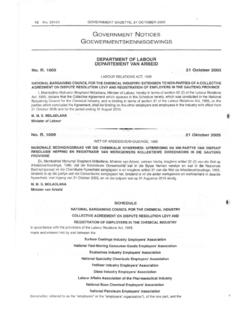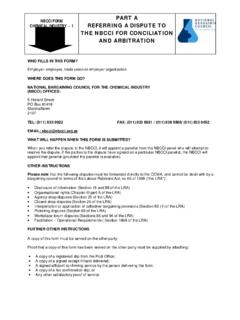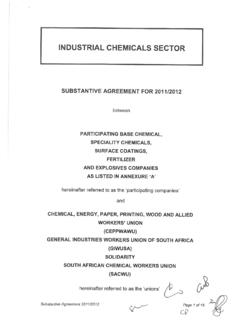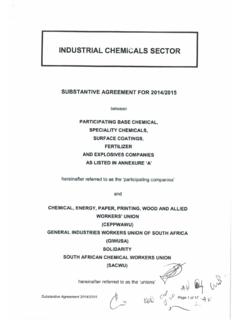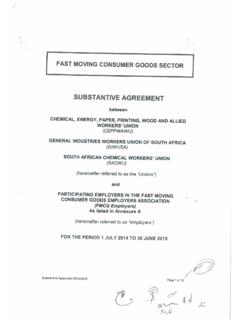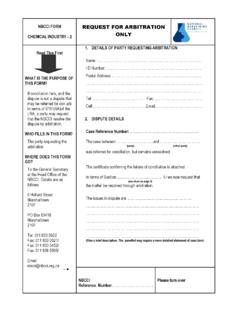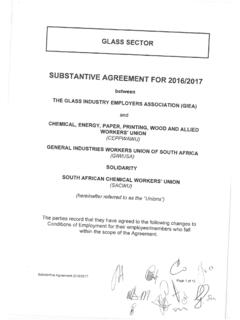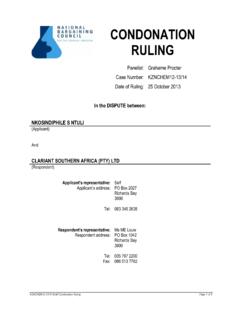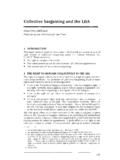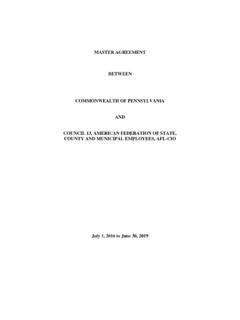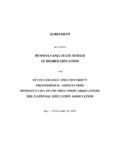Transcription of SCHEDULE 1 DISPUTE RESOLUTION PROCEDURES …
1 October 2007 SCHEDULE 1 DISPUTE RESOLUTION PROCEDURES FOR THE national bargaining council FOR THE CHEMICAL INDUSTRY ( NBCCI ) 2 T A B L E O F C O N T E N T S PART ONE SERVING AND FILING DOCUMENTS 1. How to contact the council 2. When are the offices of the council open 3. How to calculate time periods in these rules 4. Who must sign documents 5. How to serve documents on other parties 6. How to prove that a document was served in terms of the rules 7. How to file documents with the council 8. Documents and notices sent by registered post 9. How to seek condonation for documents filed late PART TWO CONCILIATION OF disputes 10.
2 How to refer a DISPUTE to the council for conciliation 11. What notice must the council give of a conciliation 12. council may seek to resolve DISPUTE before conciliation 13. What happens if a party fails to attend or is not represented at conciliation 14. How to determine whether a panellist may conciliate a DISPUTE 3 15. Issuing the outcome form in terms of section 135(5) 16. Conciliation proceedings may not be disclosed PART THREE CON ARB IN TERMS OF SECTION 191 (5A) 17. Conduct of con-arb in terms of section 191(5A) PART FOUR ARBITRATIONS 18. How to request arbitration 19. When must the parties file statements 20.
3 When the parties must hold a pre-arbitration conference 21. What notice must the council give of an arbitration 22. How to determine whether a panellist may arbitrate a DISPUTE 23. How to postpone an arbitration PART FIVE RULES THAT APPLY TO CONCILIATIONS AND ARBITRATIONS AND CON-ARBS 24. Where a conciliation or arbitration will take place. 25. Representation before the council 26. How to join or substitute parties to proceedings 27. How to correct a citation of a party 28. When a panellist may consolidate disputes 29. Disclosure of documents 4 30. What happens if a party fails to attend proceedings before the council PART SIX APPLICATIONS 31.
4 How to bring an application 32. How to apply to vary or rescind arbitration awards or rulings 33. How to apply to refer a dismissal DISPUTE to the Labour Court PART SEVEN PRE-DISMISSAL ARBITRATION IN TERMS OF SECTION 188A 34. How to request a pre-dismissal arbitration in terms of section 188A PART EIGHT GENERAL 35. Condonation for failure to comply with the rules 36. Recordings of council proceedings 37. How to have a subpoena issued 38. Payment of witness fees 39. Taxation of bills of cost 40. Certification and enforcement of arbitration awards 41. What words mean in these rules 5 PART ONE SERVING AND FILING DOCUMENTS 1.
5 How to contact the NBCCI (1) The addresses, telephone and email numbers of the offices of the council are listed in this SCHEDULE 1. (2) Documents may only be filed with the council at the addresses or telefax numbers listed in this SCHEDULE 1. 2. When are the offices of the NBCCI open (1) The national office of the council will be open every day from Monday to Friday, excluding public holidays, between the hours of 08h00 and 16h30, or as determined by the council . (2) Documents may only be filed with the council during the hours referred to in subrule (1). (3) Notwithstanding subrule (2), documents may be faxed at any time to the council .
6 3. How to calculate time periods in these rules (1) For the purpose of calculating any period of time in terms of these rules (a) day means a calendar day; and (b) the first day is excluded and the last day is included, subject to subrule (2). (2) The last day of any period must be excluded if it falls on a Saturday, Sunday, public holiday or on a day during the period between 16 December to 7 January. 4. Who must sign documents (1) A document that a party must sign in terms of the Act or these rules may be signed by the party or by a person entitled in terms of the Act or these rules to represent that party in the proceedings.
7 (2) If proceedings are jointly instituted or opposed by more than one employee, documents may be signed by an employee who is 6 mandated by the other employees to sign documents. A list in writing, of the employees who have mandated the employee to sign on their behalf must be attached to the referral document. 5. How to serve documents on other parties (1) A party must serve a document on the other parties (a) by handing a copy of the document to (i) the person concerned; (ii) a representative authorised in writing to accept service on behalf of the person; (iii) a person who appears to be at least 16 years old and in charge of the person's place of residence, business or place of employment premises at the time; (iv) a person identified in subrule (2); (b) by leaving a copy of the document at (i) an address chosen by the person to receive service; (ii) any premises in accordance with subrule (3).
8 (c) by faxing or mailing a copy of the document to the person s fax or address respectively, or a number chosen by that person to receive service; (d) by sending a copy of the document by registered post or telegram to the last-known address of the party or an address chosen by the party to receive service. (2) A document may also be served (a) on a company or other body corporate by handing a copy of the document to a responsible employee of the company or body at its registered office, its principal place of business within the Republic or its main place of business within the magisterial district in which the DISPUTE first arose; (b) on an employer by handing a copy of the document to a responsible employee of the employer at the 7 workplace where the employees involved in the DISPUTE ordinarily work or worked.
9 (c) on a trade union or employers organisation by handing a copy of the document to a responsible employee or official at the main office of the union or employers organisation or its office in the magisterial district in which the DISPUTE arose; (d) on a partnership, firm or association by handing a copy of the document to a responsible employee or official at the place of business of the partnership, firm or association or, if it has no place of business, by serving a copy of the document on a partner, the owner of the firm or the chairman or secretary of the managing or other controlling body of the association, as the case may be; (e) on a municipality, by serving a copy of the document on the municipal manager or any person acting on behalf of that person.
10 (f) on a statutory body, by handing a copy to the secretary or similar officer or member of the board or committee of that body, or any person acting on behalf of that body; (g) on the State or a province, a state department or a provincial department, a minister, premier or a member of the executive committee of a province by handing a copy to a responsible employee at the head office of the party or to a responsible employee at any office of the State Attorney. (3) If no person identified in subrule (2) is willing to accept service, service may be effected by affixing a copy of the document to (a) the main door of the premises concerned or; (b) if this is not accessible, a post-box or other place to which the public has access.

